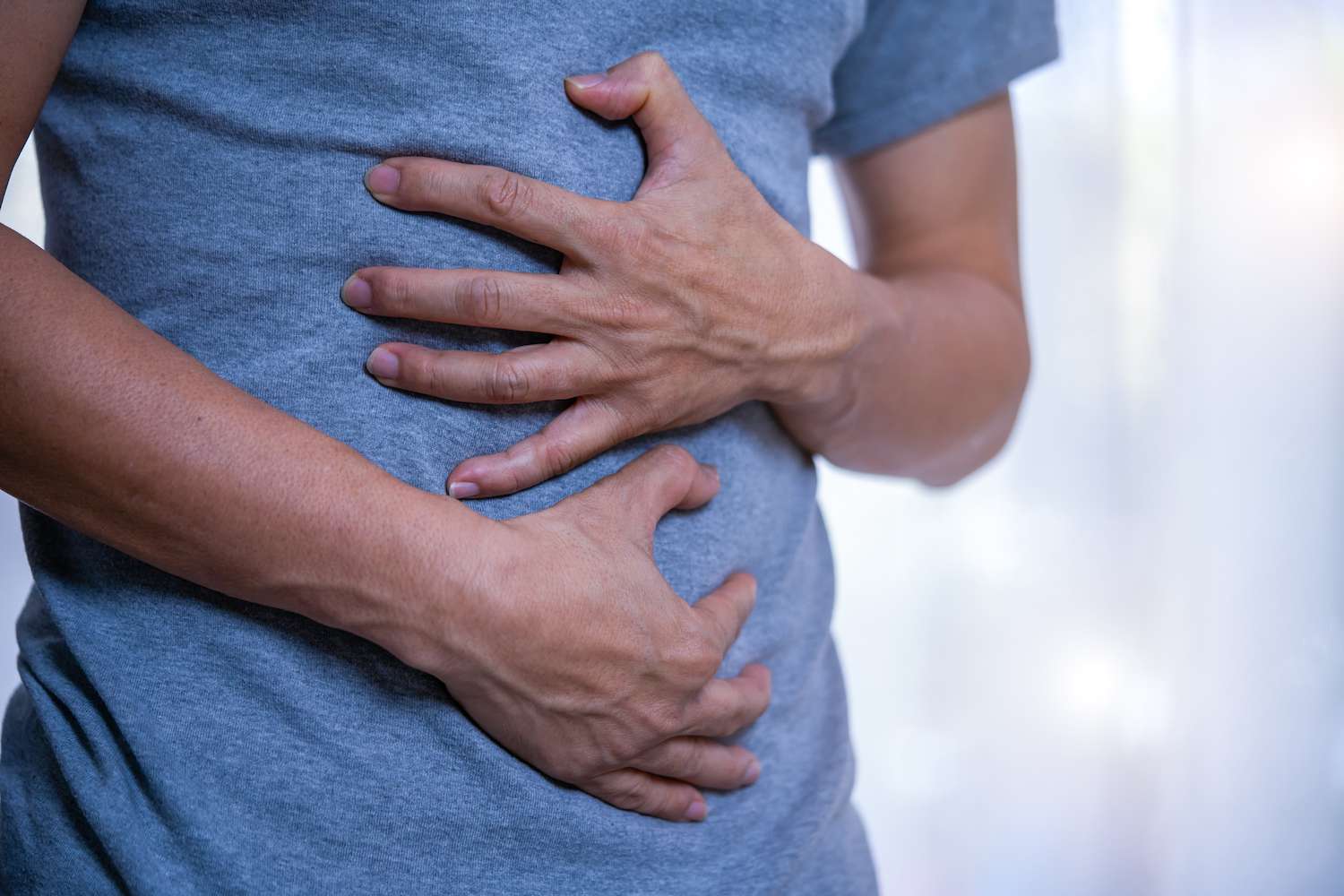

FAQs
Why Do People Fart?
Modified: August 5, 2023
(Many of the links in this article redirect to a specific reviewed product. Your purchase of these products through affiliate links helps to generate commission for Under-tec.com, at no extra cost. Learn more)
Table of Contents
Introduction
Farting, also known as passing gas or flatulence, is a natural bodily function that occurs in every human being. While it may be a source of embarrassment or humor, understanding why people fart is a fascinating topic that sheds light on the intricacies of the human digestive system. From the type of gas produced to the common causes of excessive farting, there are various factors at play.
The process of digestion is a complex series of chemical and mechanical reactions that break down food into nutrients that can be absorbed by the body. As part of this process, bacteria in the gastrointestinal tract produce gases as they ferment and metabolize food. The accumulation of these gases results in the release of flatulence in the form of a fart.
There are different types of gases that can contribute to the overall composition of a fart. The most common gases include nitrogen, oxygen, carbon dioxide, hydrogen, and methane. The proportions of these gases can vary depending on factors such as diet and gut health.
While farting is a normal bodily function, excessive farting can be a result of various factors. Certain foods and beverages, such as beans, lentils, cabbage, carbonated drinks, and dairy products, are known to cause excessive gas production. Additionally, medical conditions like irritable bowel syndrome (IBS) and lactose intolerance can also lead to increased farting. Even behavioral factors, such as eating too quickly or chewing gum, can contribute to excessive flatulence.
In this article, we will explore the different types of gas that contribute to farting, delve into the common causes of excessive farting, and discuss how certain foods can impact flatulence. We will also touch upon medical conditions and behavioral factors that can contribute to excessive gas production. Lastly, we will provide some tips on reducing excessive farting for those who may be seeking relief.
Digestion and Gas Formation
Digestion is a complex process that begins as soon as we start chewing food. When we eat, our saliva mixes with the food, breaking it down into smaller pieces and providing lubrication for easier swallowing. Once in the stomach, our food is further broken down by stomach acid and digestive enzymes.
From the stomach, food travels to the small intestine, where the majority of nutrient absorption takes place. Here, digestive enzymes from the pancreas and bile from the liver help break down carbohydrates, proteins, and fats into smaller molecules that can be absorbed into the bloodstream.
But what about gas formation? As food is broken down and the nutrients are absorbed, certain undigested carbohydrates, such as fiber, reach the large intestine. The large intestine is home to trillions of bacteria, collectively known as the gut microbiota. These bacteria aid in the fermentation and digestion of complex carbohydrates that our bodies cannot fully break down.
During the fermentation process, the gut bacteria produce gases, which can include nitrogen, oxygen, carbon dioxide, hydrogen, and methane. The proportions of these gases depend on the types of bacteria present in the gut, as well as the specific carbohydrates they ferment. The accumulation of these gases leads to the formation of flatulence or farting.
It’s important to note that not all of the gas produced during digestion is eliminated through farting. Some of it is absorbed into the bloodstream and expelled through the lungs when we exhale.
Moreover, certain factors can affect the amount of gas produced and the frequency of farting. These factors include the type and quantity of food consumed, the speed at which you eat, your gut health, and even stress levels. Understanding these factors can help you better manage and reduce excessive farting, which we will cover in more detail later in this article.
Types of Gas
When it comes to farting, there are various types of gases that can contribute to the overall composition of a fart. These gases are produced as a byproduct of the fermentation and digestion processes that occur in the gastrointestinal tract.
The most common gases found in farts include nitrogen, oxygen, carbon dioxide, hydrogen, and methane. Let’s take a closer look at each of these gases:
- Nitrogen: Nitrogen is the most abundant gas in the air we breathe, and it is ingested along with our food and drink. While it doesn’t play a significant role in contributing to the odor of a fart, it does make up a large portion of the gas expelled.
- Oxygen: Like nitrogen, oxygen is also a gas that we inhale. It doesn’t contribute to the smell of a fart but is present in the overall gas composition.
- Carbon Dioxide: Carbon dioxide is a byproduct of the fermentation and breakdown of carbohydrates in our digestive system. It is a natural part of the gas produced during digestion and can contribute to the smell of a fart, although to a lesser extent than other gases.
- Hydrogen: Hydrogen gas is produced when gut bacteria break down certain carbohydrates, such as fiber. It is a highly combustible gas and plays a role in the odor and flammability of farts.
- Methane: Methane is a gas that is primarily produced by gut bacteria when they break down carbohydrates that couldn’t be fully digested in the small intestine. It is colorless, odorless, and flammable, accounting for the characteristic smell of some farts.
The proportion of these gases can vary from person to person and depends on factors such as diet, gut microbiota composition, and individual metabolism. The combination of these gases, along with trace amounts of other gases, gives each person’s fart its unique odor and composition.
Understanding the types of gases involved in farting can help us gain a deeper insight into the processes happening in our digestive system. It also highlights the importance of maintaining a healthy gut microbiota and making dietary choices that promote good digestion and minimize excessive gas production.
Common Causes of Farting
Farting is a natural bodily function, and it is normal for people to pass gas multiple times a day. However, excessive farting can be bothersome and embarrassing. Understanding the common causes of excessive farting can help identify potential triggers and provide relief.
One of the most common causes of excessive farting is certain foods. Some foods, particularly those high in carbohydrates, are more likely to be fermented by gut bacteria, leading to increased gas production. Beans, lentils, cabbage, onions, broccoli, and carbonated drinks are examples of foods known to cause excessive gas. Additionally, foods high in sugar alcohols, such as sorbitol and xylitol, commonly found in sugar-free products, can also contribute to excessive farting.
In addition to dietary factors, medical conditions can also play a role in farting. Conditions such as irritable bowel syndrome (IBS), inflammatory bowel disease (IBD), and lactose intolerance can lead to increased gas production and frequent farting. IBS, in particular, is known for causing bloating and excessive gas due to abnormal gut motility and sensitivity.
Behavioral factors can also contribute to excessive farting. Eating too quickly can cause you to swallow air, which can lead to gas buildup in the digestive system. Chewing gum or consuming carbonated beverages can also introduce more air into the digestive tract, increasing the likelihood of farting.
Certain medications and supplements can also affect farting. Antacids that contain sodium bicarbonate can cause gas and bloating in some individuals. Furthermore, some dietary supplements, such as fiber supplements or probiotics, may increase gas production as the gut bacteria work to digest them.
Overall, if you experience excessive farting, it is essential to identify the potential triggers. Keeping a food diary can help pinpoint specific foods or situations that may exacerbate farting. If you suspect a medical condition may be contributing to excessive gas, it is recommended to consult with a healthcare professional for proper diagnosis and treatment.
In the next section, we will explore specific foods that are known to cause excessive farting and discuss how they contribute to gas production in the digestive system.
Foods that Cause Excessive Farting
For many people, certain foods are notorious for causing excessive gas and farting. These foods contain components that are difficult to digest, leading to increased fermentation by gut bacteria and subsequent gas production. If you’re prone to excessive flatulence, it may be useful to be aware of the following foods:
- Beans and Legumes: Beans and legumes, such as lentils, chickpeas, and black beans, are notorious for causing gas. They contain high amounts of raffinose, a complex sugar that cannot be broken down by human digestive enzymes. As a result, these sugars ferment in the large intestine, leading to gas production and farting.
- Cabbage Family Vegetables: Vegetables like cabbage, broccoli, cauliflower, and Brussels sprouts are rich in a compound called sulfur. When these vegetables are digested, sulfur is broken down by gut bacteria, producing gases that can lead to flatulence.
- Onions and Garlic: Onions and garlic contain fructans, which are types of carbohydrates that can be hard for some people to digest. Consumption of these foods can lead to increased gas production in the digestive system.
- Dairy Products: Some individuals may experience excessive gas and discomfort due to lactose intolerance. Lactose, the sugar found in milk and dairy products, requires the enzyme lactase to be properly digested. In lactose-intolerant individuals, the lack of lactase can lead to lactose fermentation in the gut, causing gas and bloating.
- Carbonated Drinks: Carbonated beverages, such as soda or sparkling water, contain carbon dioxide gas. When consumed, these drinks can introduce additional gas into the digestive system, leading to increased farting.
- Sugar-Free Products: Many sugar-free products contain sugar alcohols like sorbitol, xylitol, and mannitol. These substances are not easily absorbed in the intestine and can be fermented by gut bacteria, resulting in excessive gas production and flatulence.
It’s important to note that not everyone reacts the same way to these foods. While some individuals may experience excessive farting after consuming certain foods, others may not be affected at all. Additionally, cooking methods and preparation techniques, such as soaking beans before cooking or fermenting cabbage, can help reduce the gas-producing compounds.
If you find that certain foods consistently cause excessive farting and discomfort, it may be helpful to eliminate or reduce them from your diet. However, it’s essential to maintain a balanced and varied diet to ensure you are still getting all the necessary nutrients. If you have concerns about your diet or experience severe symptoms, it is recommended to consult with a healthcare professional or registered dietitian.
Medical Conditions and Farting
While occasional farting is normal, excessive or persistent farting can sometimes be a symptom of an underlying medical condition. Various conditions can affect digestion and contribute to increased gas production in the digestive system. It’s important to recognize these conditions and seek appropriate medical advice for proper diagnosis and treatment.
One common condition associated with excessive farting is irritable bowel syndrome (IBS). IBS is a chronic digestive disorder characterized by abdominal pain, bloating, and changes in bowel movements. Individuals with IBS often experience increased gas production and frequent flatulence. The exact cause of IBS is unknown, but factors such as abnormal gut motility, hypersensitivity, and alterations in the gut microbiota are believed to play a role.
Inflammatory bowel disease (IBD), including Crohn’s disease and ulcerative colitis, is another condition that can be associated with increased farting. These conditions cause inflammation in the digestive tract, leading to symptoms such as abdominal pain, diarrhea, and excessive gas production.
Lactose intolerance is a common digestive disorder characterized by the inability to digest lactose, a sugar found in milk and dairy products. People with lactose intolerance lack the enzyme lactase, which is needed to break down lactose. When lactose remains undigested, it ferments in the gut, resulting in gas, bloating, and farting.
Certain gastrointestinal infections, such as gastroenteritis or small intestinal bacterial overgrowth (SIBO), can also cause increased gas production and farting. These infections disrupt the normal balance of gut bacteria, leading to excessive fermentation and gas buildup in the digestive system.
In some cases, excessive farting can be a side effect of certain medications. Antibiotics, for example, can alter the balance of gut bacteria, leading to increased gas production. Other medications, such as nonsteroidal anti-inflammatory drugs (NSAIDs) and certain supplements, may also contribute to farting as a side effect.
If you suspect that an underlying medical condition is causing excessive farting or if you have other concerning symptoms, it is important to consult with a healthcare professional. They can evaluate your symptoms, perform diagnostic tests if necessary, and develop an appropriate treatment plan to address the underlying condition and reduce excessive gas production.
Behavioral Factors and Farting
While diet and medical conditions play a significant role in excessive farting, certain behavioral factors can also contribute to increased gas production and frequent farting. These factors, often related to eating habits and lifestyle choices, can affect the digestive process and gas accumulation in the gastrointestinal tract.
One behavioral factor that can contribute to excessive farting is eating too quickly. When you eat quickly, you tend to swallow more air along with your food. This air can get trapped in the digestive system, leading to bloating, gas, and increased farting. To reduce the amount of swallowed air, try to eat slowly, chew your food thoroughly, and take breaks between bites.
Chewing gum or using straw to drink can also lead to an increased intake of air and subsequent excessive farting. When you chew gum, you may swallow air as you chew, while using a straw can cause you to ingest more air with each sip. Limiting the use of gum and avoiding straws can help minimize gas buildup in your digestive system.
Another behavioral factor that can contribute to farting is smoking. When you smoke, you inhale and swallow air, which can lead to gas accumulation in the digestive tract. Additionally, smoking can affect the normal functioning of the gastrointestinal system, including the movement of food through the digestive system, potentially contributing to increased flatulence.
Stress and anxiety can also affect digestion and contribute to excessive farting. During times of stress, the body goes into “fight or flight” mode, redirecting blood flow away from the digestive system. This can slow down digestion and result in excessive gas production. Additionally, stress and anxiety may alter the balance of gut bacteria, further contributing to gas buildup.
To minimize farting associated with behavioral factors, it is important to adopt healthy eating habits and manage stress levels. Here are some tips to help reduce excessive farting:
- Eat slowly and chew your food thoroughly.
- Avoid chewing gum and using straws.
- Avoid smoking or limit your exposure to secondhand smoke.
- Practice stress management techniques, such as deep breathing exercises, meditation, or engaging in hobbies.
By making these small changes to your lifestyle, you can help reduce excessive farting and improve digestive health.
Reducing Excessive Farting
Excessive farting can be bothersome and embarrassing, but there are steps you can take to reduce the frequency and intensity of flatulence. By addressing dietary factors, making lifestyle changes, and potentially seeking medical advice, you can improve your digestive health and reduce excessive farting.
One of the first steps in reducing excessive farting is to identify and eliminate or reduce the consumption of foods that are known to cause gas. Keep a food diary to track your intake and make note of any foods that consistently lead to increased farting. By avoiding or limiting these foods, you can minimize gas production and flatulence. Experimenting with cooking techniques, such as soaking beans before cooking or fermenting cabbage, can also help reduce the gas-producing compounds in certain foods.
In addition to dietary changes, making lifestyle modifications can also be beneficial in reducing excessive farting. Eating slowly and chewing your food thoroughly can help prevent swallowing excessive air, reducing the risk of gas buildup in the digestive system. Avoiding chewing gum and using straws can also minimize the amount of air you swallow.
Stress management techniques, such as deep breathing exercises, meditation, and engaging in activities you enjoy, can help reduce stress-related farting. Stress management not only benefits your mental well-being but also supports healthy digestion and minimizes excessive gas production.
If you have tried dietary and lifestyle changes without significant improvement, it may be beneficial to seek medical advice. A healthcare professional can evaluate your symptoms, perform any necessary diagnostic tests, and provide guidance on appropriate treatment options. They may also be able to identify any underlying medical conditions that could be contributing to excessive farting and develop a treatment plan tailored to your needs.
It’s important to remember that occasional farting is a normal part of the digestive process, and some gas production is to be expected. However, if excessive farting is interfering with your daily life or causing discomfort, taking steps to reduce it can improve your overall well-being.
By addressing dietary factors, making lifestyle changes, managing stress levels, and seeking appropriate medical advice when needed, you can successfully reduce excessive farting and foster a healthier digestive system.
Conclusion
Farting, though often seen as a source of embarrassment or humor, is a natural bodily function that plays a vital role in the digestive process. Understanding the factors that contribute to farting can help demystify this bodily function and provide insights into our digestive health.
The process of digestion, gas formation, and the types of gas involved all contribute to the overall composition of a fart. Gases like nitrogen, oxygen, carbon dioxide, hydrogen, and methane are produced as a result of fermentation and bacterial activity in the gastrointestinal tract.
Excessive farting can be caused by various factors, including certain foods, medical conditions like IBS or lactose intolerance, behavioral factors like eating too quickly or chewing gum, and even certain medications. By identifying and addressing these factors, individuals can reduce excessive farting and improve their digestive health.
Making changes to your diet by avoiding or reducing gas-producing foods, adopting mindful eating habits, and managing stress levels can all contribute to managing excessive farting. Seeking medical advice is also important for diagnosing and treating any underlying medical conditions that may be contributing to excessive gas production.
Remember, occasional farting is normal, but if excessive farting is causing discomfort or interfering with your quality of life, it’s worth taking steps to address it. With a better understanding of the factors involved and the appropriate strategies in place, you can achieve a healthier digestive system and experience reduced farting.
So, embrace your body’s natural processes, make informed choices about your diet and lifestyle, and seek the help of healthcare professionals when needed. By doing so, you can manage excessive farting and enjoy improved digestive health and overall well-being.










